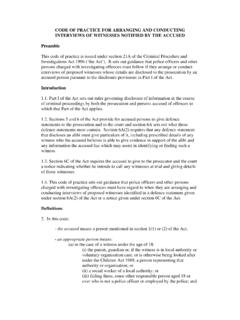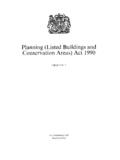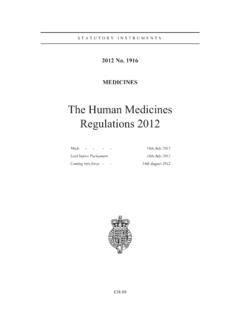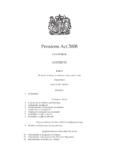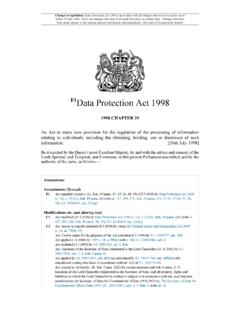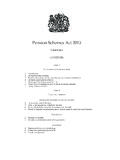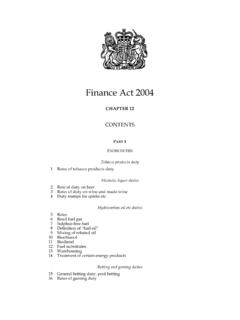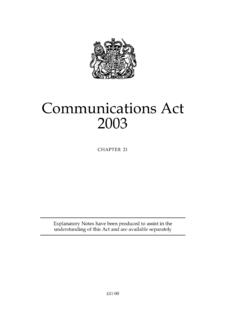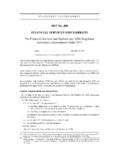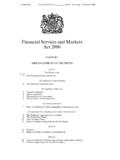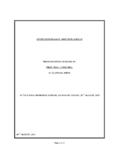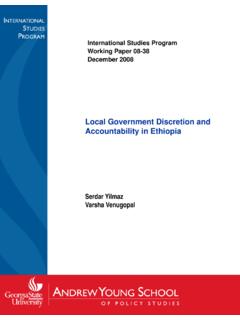Transcription of 2013 No. 1624 EDUCATION, ENGLAND The School …
1 S T A T U T O R Y I N S T R U M E N T S 2013 No. 1624 EDUCATION, ENGLAND The School governance ( roles , procedures and Allowances) ( ENGLAND ) regulations 2013 Made - - - - 1st July 2013 Laid before Parliament 8th July 2013 Coming into force - - 1st September 2013 The Secretary of State for Education, in exercise of the powers conferred by sections 19(3), 19(8), 21(3), 23, 24, 34(5) and 210(7) of the Education Act 2002(a) and sections 519 and 569(4) of, and paragraphs 3, 15(1)(b), 15(2)(c), 15(2)(e), 15(2)(f) and 15(2)(h) of Schedule 1 to the Education Act 1996(b) makes the following regulations : PART 1 Introduction Citation, commencement and application 1. (1) These regulations may be cited as the School governance ( roles , procedures and Allowances) ( ENGLAND ) regulations 2013 and come into force on 1st September 2013. (2) These regulations apply in relation to ENGLAND only. (3) Parts 2 to 6 of and Schedules 1 and 2 to these regulations apply only in relation to maintained schools.
2 (4) Regulation 4 and Schedule 2 to these regulations make certain amendments, including amendments to the School governance (Federations) ( ENGLAND ) regulations 2012(c) to apply these regulations , with modifications, to governing bodies of federations. (5) Part 7 of and Schedule 3 to these regulations make amendments to the Education (Pupil Referral Units) (Management Committees etc) ( ENGLAND ) regulations 2007(d) to apply these regulations to pupil referral units. (a) 2002 ( the 2002 Act ). See section 212 of the 2002 Act for the definition of regulations . Section 19 of the 2002 Act was amended by section 38 of the Education Act 2011 (c 21). (b) 1996 ( the 1996 Act ). See section 579(1) of the 1996 Act for the definition of regulations . Section 569(4) of the 1996 Act was amended by the Education (Wales) Measure 2009 (2009 ).
3 Paragraph 3 of Schedule 1 to the 1996 Act was amended by 2010/1158. Paragraph 15 of Schedule 1 to the 1996 Act was inserted by section 48 of the Education Act 1997 (1997 ) and was amended by section 140(1) and (3) of, and paragraph 184 of Schedule 30 to, and Schedule 31 to, the School Standards and Framework Act 1998 (1998 the 1998 Act ); 2010/1158; and section 54(1) of, and paragraph 9 of Schedule 13 to, the Education Act 2011. (c) 2012/1035. (d) 2007/2978, which was amended by 2012/1825 and 2012/3158. 2 Interpretation 2. In these regulations the EA 1996 means the Education Act 1996; the SSFA 1998 means the School Standards and Framework Act 1998(a); the EA 2002 means the Education Act 2002; the EIA 2006 means the Education and Inspections Act 2006(b); the Constitution regulations 2007 means the School governance (Constitution) ( ENGLAND ) regulations 2007(c); the Constitution regulations 2012 means the School governance (Constitution) ( ENGLAND ) regulations 2012(d); clerk means the person appointed as clerk to the governing body, or as the case may be, to a committee of the governing body.
4 In relation to a governing body to which the Constitution regulations 2007 apply, associate member has the meaning given in regulation 11 of the Constitution regulations 2007, and in relation to a governing body to which the Constitution regulations 2012 apply, associate member has the meaning given in regulation 12 of the Constitution regulations 2012; a committee means a committee established by the governing body to which the governing body has delegated any of its functions; a governing body or the governing body of a School means the governing body of a School to which the provision applies, and a governor means a member of such a governing body; the local authority means the local authority that maintains any School to which the provision applies; meeting of the School means a meeting of the governing body or of a committee; receipt includes other evidence establishing the amount of any expenditure; and a School means a maintained School within the meaning of section 39(1) of the EA 2002.
5 Revocation 3. The Education ( School Government) (Terms of Reference) ( ENGLAND ) ( regulations ) 2000(e), the Education (Governors Allowances) ( ENGLAND ) regulations 2003(f) and the School governance ( procedures ) ( ENGLAND ) regulations 2003(g) are revoked on 1st September 2013. (a) 1998 (b) 2006 (c) 2007/957. (d) 2012/1034. (e) 2000/2122, which was amended by 2006/2661, 2010/1172 and 2012/1845. (f) 2003/523, which was amended by 2010/1172 and 2012/979. (g) 2003/1377, which was amended by 2003/1916, 2004/450, 2007/959, 2007/3464, 2009/2680 and 2010/1172. 3 Amendments to the School governance (Collaboration) ( ENGLAND ) regulations 2003 and the School governance (Federations) ( ENGLAND ) regulations 2012 4. The amendments made by Schedule 2 have effect.
6 Service of notices 5. Any notice required to be served by or under these regulations is to be served in accordance with section 572 of the EA 1996. PART 2 roles of the Governing Body and Head Teacher 6. (1) The functions of the governing body include the following core functions (a) ensuring that the vision, ethos and strategic direction of the School are clearly defined; (b) ensuring that the head teacher performs his or her responsibilities for the educational performance of the School ; and (c) ensuring the sound, proper and effective use of the School s financial resources. (2) In exercising their functions the governing body shall (a) act with integrity, objectivity and honesty and in the best interests of the School ; and (b) be open about the decisions they make and the actions they take and in particular shall be prepared to explain their decisions and actions to interested parties. (3) The governing body must appoint a clerk with a view to ensuring their efficient functioning and must have regard to advice from the clerk as to the nature of the governing body s functions.
7 (4) The head teacher s responsibilities include (a) the internal organisation, management and control of the School ; and (b) the educational performance of the School . (5) The head teacher is accountable to the governing body for the performance of all his or her responsibilities. (6) The head teacher must comply with any reasonable direction of the governing body. (7) In this regulation the term governing body includes the temporary governing body of a new School . PART 3 Appointment, Functions and Removal of Officers Election of the chair and vice-chair 7. (1) Subject to section 67 of the EIA 2006 (power of Secretary of State to appoint additional governors), the governing body must elect a chair and a vice-chair from among their number. (2) Prior to the election of the chair and vice-chair, the governing body must determine the date on which the term of office of the chair and vice-chair will end. (3) A governor who is employed at the School as a teacher or as any other member of the School s staff is not eligible to be chair or vice-chair of the governing body of that School .
8 (4) The chair or vice-chair may at any time resign their office by giving notice in writing to the clerk to the governing body. (5) The chair or vice-chair ceases to hold office 4 (a) if that person ceases to be a member of the governing body; (b) if that person is employed at the School as a teacher or as another member of the School s staff; or (c) if that person is removed from office in accordance with regulation 9 or replaced by a chair nominated by the Secretary of State pursuant to section 67 of the EIA 2006. (6) Where a vacancy arises in the office of the chair or vice-chair, the governing body must elect one of their number to fill that vacancy at their next meeting. (7) Where the chair is absent from any meeting or there is at the time a vacancy in the office of the chair, the vice-chair is to act as chair for all purposes. Delegation of functions to the chair or vice-chair in cases of urgency 8. (1) Where paragraph (2) applies, the chair may exercise (a) any function of the governing body which can be delegated to an individual; and (b) any function that under regulation 19(2) cannot otherwise be delegated to an individual.
9 (2) The circumstances are that the chair is of the opinion that a delay in exercising the function would be likely to be seriously detrimental to the interests of (a) the School ; (b) any pupil(a) at the School , or their parent; or (c) a person who works at the School . (3) In paragraph (2), delay means delay until the earliest date on which it would be reasonably practicable for a meeting of the governing body, or of a committee to which the function in question has been delegated, to be held. (4) Where it appears to the vice-chair that (a) the circumstances mentioned in paragraph (2) apply, and (b) the chair (whether by reason of vacancy in the office or otherwise) would be unable to exercise the function in question before the detriment referred to in that paragraph is suffered, the reference in paragraph (1) to the chair is to be read as if it were a reference to the vice-chair. Removal of the chair or vice-chair from office 9.
10 (1) The governing body may by resolution remove the chair from office, unless the chair has been nominated by the Secretary of State pursuant to section 67 of the EIA 2006. (2) The governing body may by resolution remove the vice-chair from office. (3) A resolution to remove the chair or vice-chair from office will not have effect unless the matter is specified as an item of business on the agenda for the meeting. (4) Before the governing body resolve to remove the chair or vice-chair from office, the governor proposing the chair or the vice-chair s removal must at that meeting state their reasons for doing so and the chair or vice-chair, as the case may be, must be given an opportunity to make a statement in response, before withdrawing from the meeting. Appointment and removal of the clerk to the governing body 10. (1) This regulation is without prejudice to any rights and liabilities which the clerk may have under any contract with the governing body or with the local authority.
